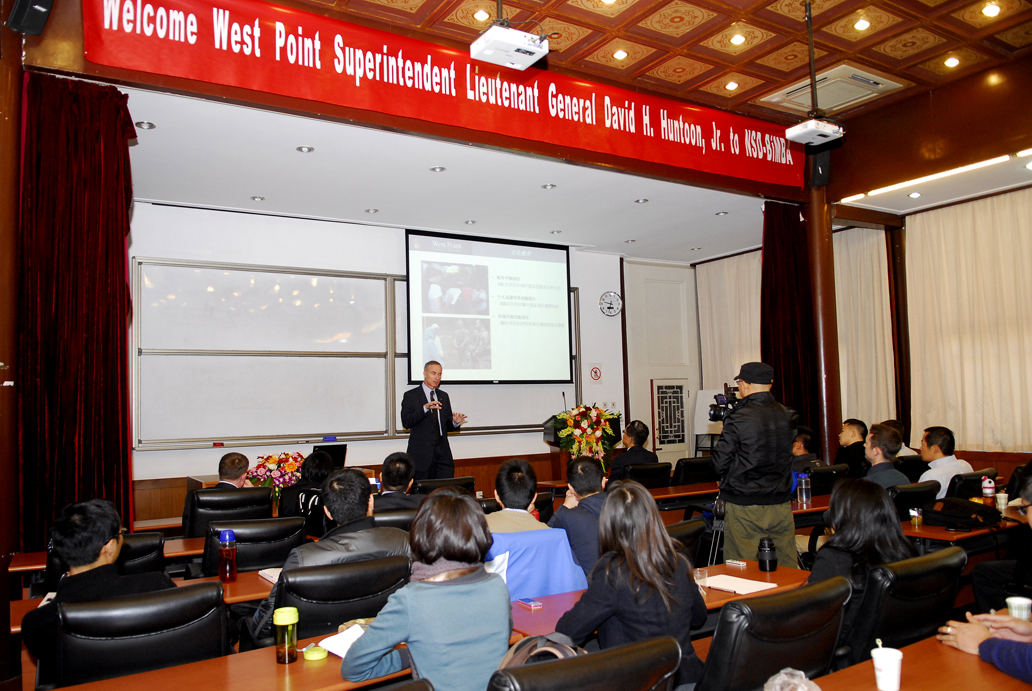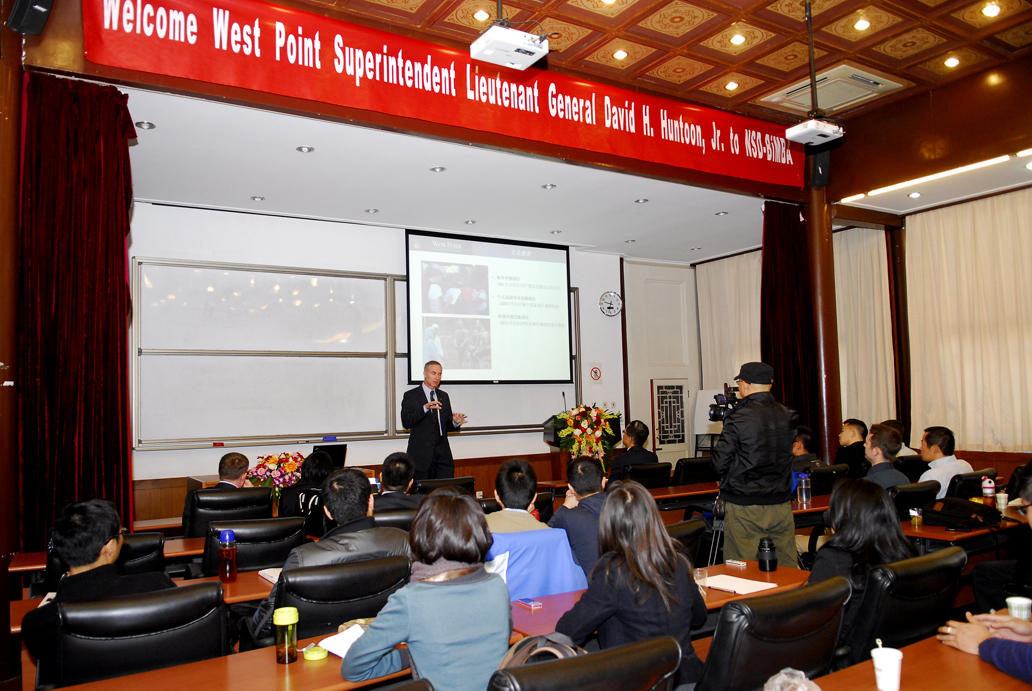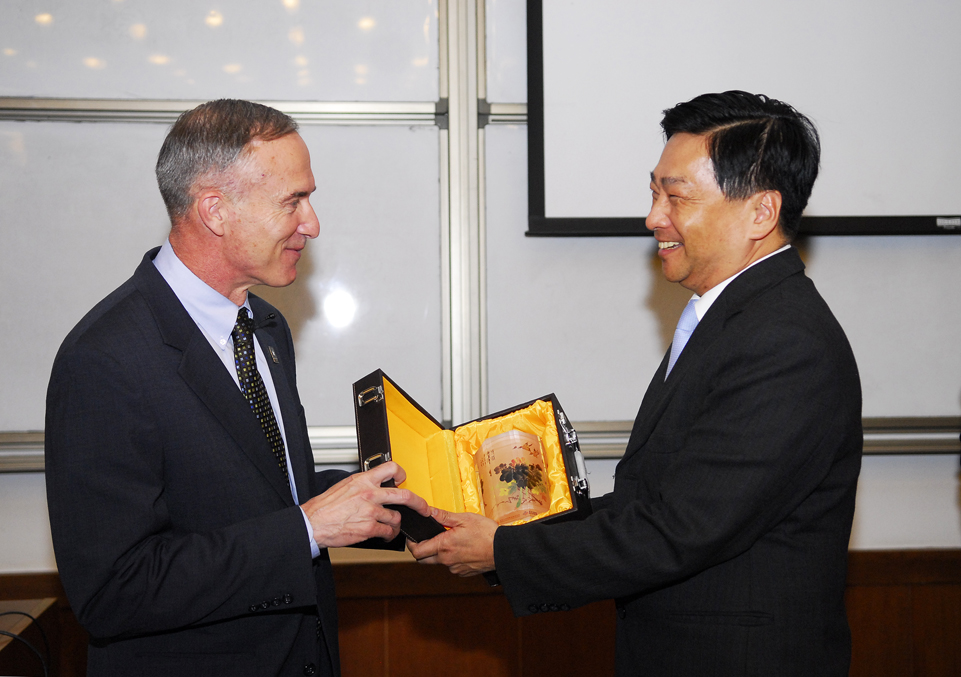
—West Point Superintendent David H, Huntoon, Jr. Visit to BiMBA

Have you ever been to West Point? Do you want to know the schedule of students at West Point? Have you ever thought that why there are so many successful men emerged from the West Point? West Point Superintendent David H, Huntoon, Jr. “Leaded” Us into West Point, to let us get in touch with the cadets in West Point, learning the way of management, and grasping the value of leader of character.
On October 24th, 2011, West Point Superintendent David H, Huntoon, Jr. was invited into the Zhifuxuan, Langrun Garden to make a speech on the leadership of West Point. John Yang, Dean of BiMBA, hosted the event.
West Point and BiMBA have long been strategic partners in MBA education, especially in the field of leadership development program. Leaded by Prof. John Yang, faculty members and students of BiMBA have been visiting West Point every year since 2005, focusing on the study of West Point’s unique leadership philosophy. As the host of the event, Prof. John Yang believed that Mr. Hunton’s visit will enhance the constructive relationship between West Point and BiMBA, hoping that more exchange activities would be held in the future.

Glory and mission
West Point (The United States Military Academy at West Point) was established at 1802, which is one of the oldest military academy in the U.S. West Point is famous for its motto of Duty, Honor, and Country, which has inspired a whole generation of Americans. Its alumni are collectively referred to as "The Long Gray Line" and its ranks include two American presidents, numerous famous generals, and seventy-four Medal of Honor recipients. Besides, many senior managers and CEOs of top business firms in the US are all West Point graduates. The special emphasis on leadership building has been West Point's tradition.
Education, training and inspiring are the three missions for West Point, and Mr. Hunton emphasized that inspiring is very important for leadership. So that each graduate of West Point is a commissioned leader of character committed to the values of Duty, Honor, Country. The cadets should understand the mission from their very first day, and understand their purpose is to get wonderful education over 47 months, and their work is to become the leaders of character.  West Point focuses on international capacity. There are 53 international students from 33 countries who stay for all 47 month, and some of them from China. Mr. Hunton hopes to sustain this relationship for many years, because the presence of students from other country is central to the quality education experience and to the leadership development experience at West Point. The ability of West Point to listen to other voices from around the world, to understand their perspectives, to begin to apprehend the nature and culture outside West Point is critical to the leaders for seeking success. So presence of international students is central in the leader development. Mr. Hunton also hopes to see the number of international students in the West Point could go up in the next decades.
West Point focuses on international capacity. There are 53 international students from 33 countries who stay for all 47 month, and some of them from China. Mr. Hunton hopes to sustain this relationship for many years, because the presence of students from other country is central to the quality education experience and to the leadership development experience at West Point. The ability of West Point to listen to other voices from around the world, to understand their perspectives, to begin to apprehend the nature and culture outside West Point is critical to the leaders for seeking success. So presence of international students is central in the leader development. Mr. Hunton also hopes to see the number of international students in the West Point could go up in the next decades.
Cadets training: moral character comes first
On the first day at West Point, each cadet will get a card, namely Cadet Honor Code which states "A cadet will not lie, cheat, steal, or tolerate those who do." Mr. Hunton said the ethical code is critical to value the leadership. And the value must be based on trust, which is very important to intensify the theory of leadership. The purpose of a leader is trying to doing the right thing when no one is looking.
The faculty of West Point is a wonderful group. 55% of those are young men and women who have served as captain and some cases as mayors, officers in the United States army, so they have had many experiences in teaching and management. The ratio of teacher and cadet is about 1 to 14, 1 to 17 of most of classes at West Point, which is very small. Because it can intensify the connection between the teacher and cadets in class, Mr. Hunton explained the reason.
The cadets at West Point are very busy. They have to get up at 5:30, standing formation even on cold mornings. And also they have very busy academic day, and have many classes, both in the morning and afternoon. In the evening all the cadets would share a meal together, after that they continue to study. West Point combines academic study, athletic training and military development together, so managing time well is very important for all the cadets.  The academic program consists of 26 core courses which establish the foundation for elective courses that permit cadets to explore in greater depth more than 40 majors. All cadets receive a Bachelor of Science degree, and are fully prepared to meet the intellectual requirements of a leader in today's Army. Each year, 140 cadets will be sent abroad, ten of those students typically come here to China. Mr. Hunton said the presence of ten cadets out of 140 here in china is very important for West Point, for this allows young women and men to listen to another voice, and another perspective. At West Point, the cadets work so hard that some even set the spring break aside to take advantage of this opportunity to study abroad to listen and to learn.
The academic program consists of 26 core courses which establish the foundation for elective courses that permit cadets to explore in greater depth more than 40 majors. All cadets receive a Bachelor of Science degree, and are fully prepared to meet the intellectual requirements of a leader in today's Army. Each year, 140 cadets will be sent abroad, ten of those students typically come here to China. Mr. Hunton said the presence of ten cadets out of 140 here in china is very important for West Point, for this allows young women and men to listen to another voice, and another perspective. At West Point, the cadets work so hard that some even set the spring break aside to take advantage of this opportunity to study abroad to listen and to learn.
The military training begins on the first day at West Point, and it begins from learning how to be a follower. On the first day of cadets at West Point, all the cadets would get their clothes changed, and their hair cut. Also they would learn how to turn to the right and turn to the left and how to march. At the end of the first day, they gather in an important ceremony, raising their right hand, taking oath to national Constitution of the United States. Some of the cadets would be sent to military schools during the summer to develop skills that will serve them well. So each year, they learn more and more about what is like to be a leader. Each cadet serves a leadership role at West Point. During the first four years, they will be responsible for the command of several cadets. Increasing, they take more leadership responsibility, in the 5 year, they command, and in charge of more cadets.
The physical development at West Point includes both physical education classes and competitive athletics. Every cadet participates in an intercollegiate, club or intramural level sport each semester. Mr. Hunton said physical program is a big part of leadership development, because the cadets are constantly getting mentoring, coaching and leadership construction from their faculty and academic subjects from their military leaders, here also from their athletic coaches.

The speech has also inspired a heated discussion, and for each question Mr. Hunton gave a brief but precise answer. When asked the connection between leadership and competition, Mr. Hunton said that West Point focuses on the combination of academic study, military training and physical development. Everyone in the team is participating in some way is a leader. They focus on victory, on wining the competition, and all these are virtues that we praise in the military. Leadership is about setting aside selfish, focus on success. So those are connections between military leadership and competition. When asked how the cadets in West Point achieve self-discipline, Mr. Hunton said: “It is easy for the cadets in West Point, because the students are living in the west point 24 hours a day. We will provide you with guidance, coaches or military officers, so you get a lot of help. And then we trust you, you have interest in your own life, and we trust you will find the right balance in academic, military, physical and your own personal requirements. We have plenty of people in west point to guild you. It is the combination of both direction and trust, and the last part is more important, because in the long run, you are the one to create your own destiny.”
At the end of the lecture, Prof. Wu on behalf of the National School of Development thanked the guests with BiMBA souvenir for his splendid speech.